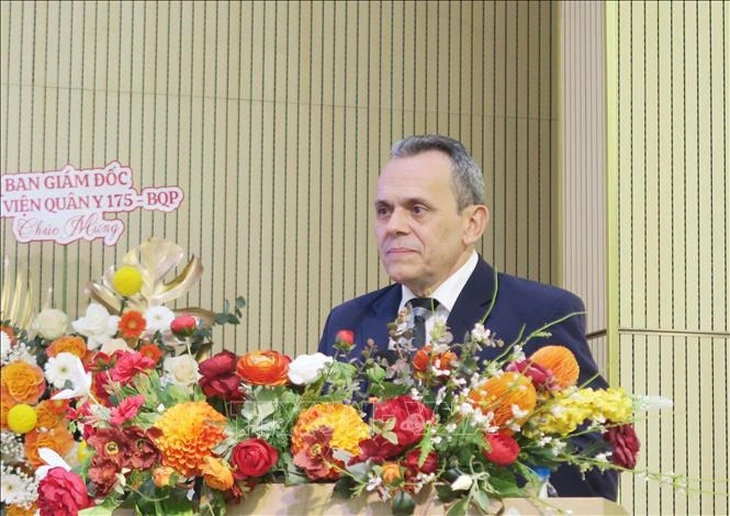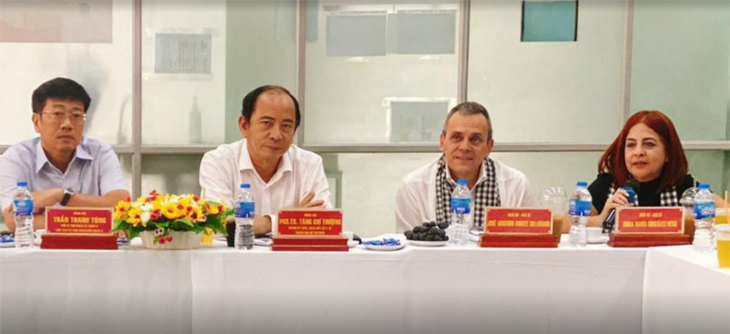Health authorities in Ho Chi Minh City will advise the municipal administration to apply Cuba’s family doctor model in five districts on a trial basis the aim of strengthening public health protection, Dr. Tang Chi Thuong, director of the Department of Health, said recently.
Dr. Thuong made the statement at a workshop conducted by the department on Friday to learn about Cuba’s family doctor model.
The event was attended by Cuban Prof. Dr. José Armando Aronte Villamarín and Prof. Dr. Sonia María González Vega, who paid a working visit to the city recently at the invitation of the department.
After providing city officials with an overview of the Cuban family doctor model, which has been in operation for 40 years, Prof. Villamarín noted that implementing this model in Ho Chi Minh City may encounter challenges due to the concentration of the medical workforce in significant numbers within hospitals.
He pointed out that this situation contrasts sharply with Cuba, where over 50 percent of doctors and nurses are assigned to basic health care services.
In Cuba, doctors at grassroots health facilities receive regular and comprehensive training.
The professor highlighted that Cuba's primary human resource for grassroots healthcare systems is comprehensive medical doctors.
In Cuba, a general clinic, equivalent to a district-level health center in Vietnam, has 20-30 family doctor offices each of which is responsible for providing healthcare to 1,000-1,500 people.
Prof. Villamarín emphasized the vital role of family doctor offices in Cuba, strategically situated in residential areas, actively contributing to primary healthcare.
In this model, family doctors visit patients at their homes, conducting examinations, evaluations, and classifications.
This approach enables tailored care, consultation, and treatment based on the specific needs of individuals.
The Cuban experts pointed out many challenges facing Ho Chi Minh City in developing a model of family doctors like Cuba’s.
One challenge lies in the fact that the human resources at the grassroots level for medical services are still insufficient compared to the demands and objectives of establishing a comprehensive family medicine network.
|
|
| Cuban Prof. Dr. Sonia María González Vega and Prof. Dr. José Armando Aronte Villamarín (R, 1st and 2nd) are seen at a working session with health authorities in District 8, Ho Chi Minh City. Photo: T.T. / Tuoi Tre |
Another challenge is the difficulty in persuading and encouraging private clinics to participate in a family medicine network that prioritizes the concept of prevention over cure.
Prof. Villamarín emphasized the critical understanding that a family doctor is not someone expected to treat all diseases.
Instead, a family doctor should genuinely function as a consultant, focusing on disease prevention, managing common illnesses, and promptly liaising with specialist doctors at hospitals when required.
Agreeing with the opinions of the Cuban expert, Dr. Thuong affirmed that he has anticipated the challenges the city has to overcome during the transformation of grassroots health stations into family doctor networks.
He really hoped to receive advice and support from Cuba's leading medical experts so that the health department can successfully build a family doctor model like Cuba’s in the near future.
It is necessary to sign a memorandum of understanding between the Ministry of Health of Cuba and Ho Chi Minh City’s health authorities on short-term training, consultancy, and sharing experience in building a roadmap to set up a family medicine system, Dr. Thuong suggested.
Thuong expressed his willingness to provide consultation to the city’s administration in the process of selecting five rural districts for piloting the Cuban family doctor model.
“I want this model to be piloted in Binh Chanh District as it will be tremendously useful in taking care of public health,” said Tran Van Nam, secretary of the Binh Chanh Party Committee, who has recently paid a working visit to Cuba.
In addition to the family doctor model, the city also wishes to cooperate with Cuba in trade and production of drugs, vaccines and biopharmaceuticals. Dr. Thuong said.
Since being initiated by Cuban President Fidel Castro in 1984, the family medicine network has accumulated a total of 12,833 family doctors, attaining a rate of one family doctor for every 857 people.
This model has made it easier for Cuban people to access to primary healthcare services, and their health indicators have thereby improved significantly.
Notably, Cuba has a completely free healthcare system and can self-produce many kinds of medicines and vaccines.
This Latin American country has so far sent 23,000 doctors to 55 countries around the world to offer medical assistance to local health systems.
Like us on Facebook or follow us on Twitter to get the latest news about Vietnam!





















































